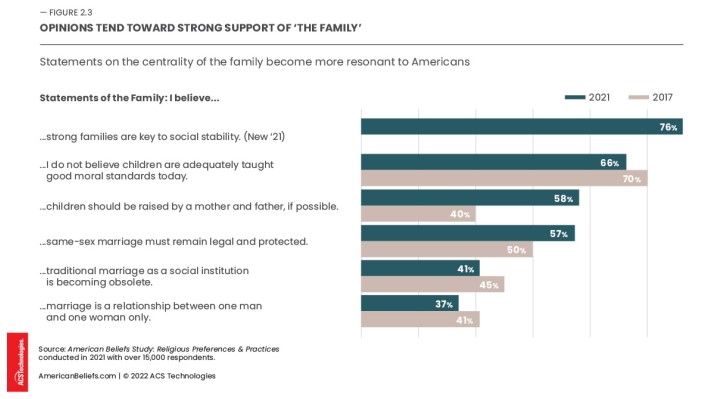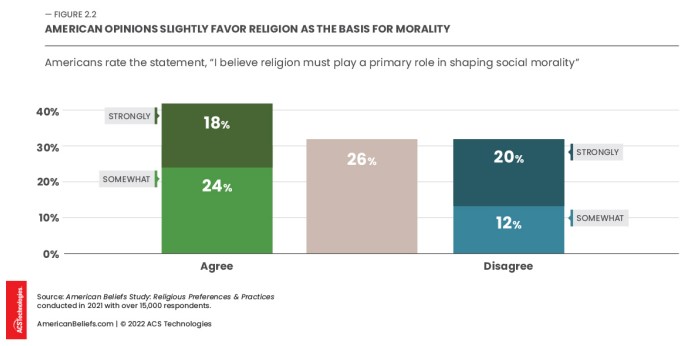The American people are unhappy with the moral condition of our country. Maybe that’s not news, but consider a few specifics:
- More than two in three Americans (69%) believe “America has a moral responsibility to be a force for good in the world.”
- Two in three Americans (66%) don’t believe “children are adequately taught good moral standards today.” Only 14% feel America’s children receive sufficient moral education.
- A majority of Americans (57%) believe “our society must give more attention to accomplishing economic justice.” Only 17% disagree.
- The same percentage (57%) see “asking the rich to pay a higher tax rate” is a way to achieve economic justice.
- Most (56%) believe “greater emphasis must be given to embracing our ethnic diversity.”
- And most (55%) disagree with the idea that “race relations in the United States are generally good.”
These findings are from the American Belief Study, conducted in both 2017 and 2021, which presented a list of 25 statements about social issues to a carefully-designed, representative sample of 15,000 Americans. It asked them to rate each on a five-point scale, from ‘Strongly Agree’ to ‘Strongly Disagree.’ In the analysis presented here, we’ve combined the percentages of the two ‘agree’ ratings into a total, and the same for the two ‘disagree’ ratings.
Let’s take one area. Consider how Americans are thinking about the family.
- On the role of the family in society, three in four respondents (76%) “believe strong families are key to social stability.”
- On the raising of children, a majority of respondents (58%) said they “believe children should be raised by a mother and father, if possible.” This item saw a sharp change in response over the past four years, jumping from 40% agreement in 2017 to 58% agreement in 2021. While not necessarily tied together, we’ve already mentioned that two in three Americans feel our children receive insufficient moral education.
- But what is a family? On this, responses were mixed. Those who believe “traditional marriage as a social institution is becoming obsolete” is actually shrinking, with 41% who agreed now vs. 45% in 2017. There was no majority sentiment on this statement, with 30% disagreeing and 29% having no opinion.
- Similarly, no majority agrees that “marriage is a relationship between one man and one woman only:” 46% disagreed and just 37% agreed. Four years ago, a stronger 41% agreed with that statement.
- Related to that, there was a solid majority opinion (57%) on the idea that “same-sex marriage must remain legal and protected.” This item saw a dramatic jump of seven percentage points in the past four years. In 2017, 50% agreed. So the percentage of Americans who want to affirm same-sex marriage is high and growing.

There are some points of inconsistency here. On the one hand, a strong majority of Americans want to defend the legal status of same-sex marriage, but on the other hand, a strong majority believe children should be raised by a mother and a father, which implies a female and a male parent.
Also this: one the one hand, more Americans now say the traditional idea of marriage isn’t obsolete, while the share of Americans who believe “marriage” is a relationship between one man and one woman only is waning.
The study uncovered similar conundrums in other areas.
On the question of moral guidance, Americans are both hungry and confused.
They are unhappy with the moral and social state of our nation, but also inconsistent with the moral and social positions they hold. The country needs both moral help and moral clarity.
Underneath all this is a larger question. Where should these beliefs and opinions come from? When our children receive inadequate moral teaching, what are those “good moral standards” and who should teach them?
An important part of the answer to that two-part question comes from one of the 25 statements respondents rated, that has to do with the role of religion.

One-third of Americans (32%) disagree with the statement; 42% agree. Sure 42% is not a majority, but it is a significant ten points higher than those who disagree.
This is a strongly worded statement. It did not suggest that it would be “good” or “helpful” if religion had a role in shaping morality, but that it “must” play a role. Nor did it infer religion should just be one of many influential voices, but that it must play “a primary role.” So the question didn’t ask if people thought religion should have a seat at the table; it asked if they thought religion should be at the head of the table. To that strong statement, 42% answered “yes it should.”
While not all in America look to the Church for moral guidance, millions do. This presents both an opportunity and a responsibility.
As Christians, we look to the teachings of Jesus Christ and the Bible for moral guidance and clarity. We look forward to the kingdom of God, when all peoples and nations will live under the righteousness and justice of God. That vision inspires and guides how we live our lives, and also how we evaluate, and speak to, the moral status of society.
Key Findings:
- Most Americans are unhappy with the present state of the moral education of children, economic justice, race relations, and how ethnic diversity is treated in the country.
- The percentage of the population who believe “same-sex marriage must remain legal and protected” is rising rapidly – from 50% in 2017 to 57% in 2021.
- The percentage of the population who believe “children should be raised by a mother and father, if possible” is also rising rapidly – from 40% in 2017 to 58% in 2021.
- A large percentage of Americans, 42%, believe “religion must play a primary role in shaping social morality.”
Ideas for Your Church:
- Study, discuss, and clarify your church’s understanding of what the Bible teaches on the moral and social issues of our society. Find appropriate ways to speak out in the community.
- Give more space to clear, bold moral education from the pulpit and from all your teaching ministries.
- Look at the status of Christian moral education in your church for all age groups: children, youth, families, and adults.
- Find creative ways to say to your community, “This church is the place where your children and youth can learn right from wrong.”
About this study
This online study among 14,942 American adults was conducted by Campbell Rinker for ACST from October 2020 through February 2021. Results were balanced by US region, 19 ‘Mosaic’ demographic clusters from Experian, and weighted by age to align with known population characteristics. The study carries a maximum margin of error of ±1.97% at the 95% confidence level within any US Census region. A comparative 2017 study involved the same size audience.
About the Authors
Dirk Rinker is president and CEO of Campbell Rinker. A leading market researcher for nonprofits since the early 1990s. He has designed and implemented research projects for hundreds of prominent mission organizations, charities, universities, and museums in the U.S. and internationally – helping clients understand and act on the attitudes, motivations, and perceptions of their valuable constituencies.
Michael Jaffarian is a writer, researcher, and consultant to nonprofits. He and his wife were missionaries for 33 years, serving in Singapore, Virginia, Los Angeles, and England. Most of his ministry has been in global mission research. He has studied and written on growth trends among tens of thousands of Christian denominations globally.


